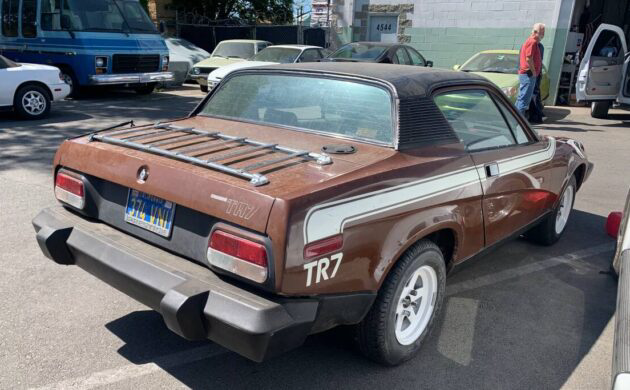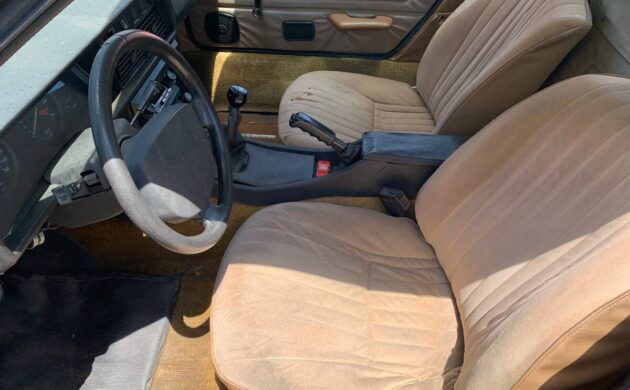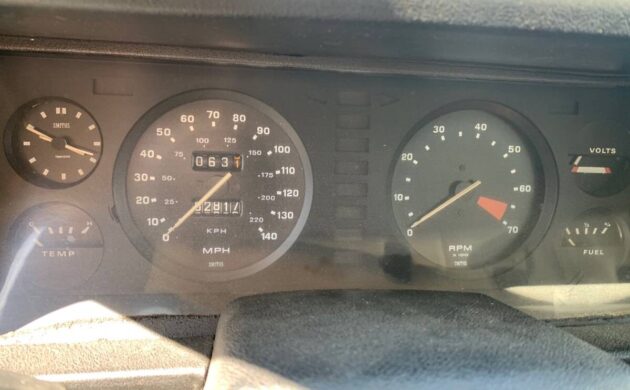Awaiting TLC: 1976 Triumph TR7 Victory Edition
Opinions about the Triumph TR7 have undergone a reformation. When it arrived on roads in 1974, it was often reviled. The Speke factory in Liverpool, where the car was first manufactured, was renowned for difficulties – often blamed on labor. But in fact, the plant itself was not well designed, having never been tested at making an entire car before the TR7 was conceived. Workers interviewed in this article indicate that the TR7 was also the victim of relentless engineering revisions, as well as the “measured day work” system that kept the line running to meet production figures at the cost of quality. Compounding its problems, the cat-and-mouse game with US government regulations was underway. Still, today, modern restoration methods have cured many of the TR7’s ills, allowing its true nature to emerge: a sporty, well-handling, distinctive-looking runabout that has invigorated fans of “the shape of things to come”. Here on craigslist is a 1976 Triumph TR7 “Victory” edition for sale at $1300. This car is located in Simi Valley, California and it needs quite a bit of work to bring it up to snuff. Thanks to Rocco B. for this tip!
The Victory edition of the TR7 was ostensibly produced to celebrate Triumph’s success at pro-rallying with driver John Buffum in a specially-prepared TR7. One interesting time shift that I detected was that the wins did not come until 1977, but the car itself was produced starting in 1976. In any event, the car’s distinguishing features included special striping, a vinyl top, and white spoker wheels. Those wheels were a source of anguish, as they were recalled for collapsing. While I always appreciate engine photos in an ad, some sellers just don’t feel the same way, so suffice it to say that the motor here should be a 1998 cc in-line four-cylinder with about 90 bp and just over 100 lb-ft of torque – wheezy at best. The gearshift is a balky four-speed manual. The later five-speed was a better ‘box. The seller notes that the car “will run” but needs a coolant leak fixed.
The interior is broadcloth (a money-saver for the tottering British Leyland). The usual tears in the cloth, wrinkling in the panels, and fading are present. None of these can necessarily be blamed on lack of care: keeping a TR7’s condition stable is a battle. They deteriorate before your very eyes.
The gauges are set in black plastic, and if this dash isn’t cracked it will be a miracle. These cars are getting to be a bit of a trick to resurrect since parts are surprisingly difficult and expensive to obtain. Perhaps supply chains will straighten out, but the Moss Motors TR7 catalog currently has several “NA” notations, in slots where you really don’t want parts to be missing, like bearings and piston rings. Speaking of which, perhaps at this price, this car could be best used as a donor. What do you think?
Auctions Ending Soon
 2002 Subaru Impreza WRXBid Now17 hours$333
2002 Subaru Impreza WRXBid Now17 hours$333
 1975 Chevrolet Corvette ConvertibleBid Now18 hours$4,000
1975 Chevrolet Corvette ConvertibleBid Now18 hours$4,000
 1964 Ford F-100 Camper CustomBid Now19 hours$2,000
1964 Ford F-100 Camper CustomBid Now19 hours$2,000
 2006 Jeep Wrangler SportBid Now2 days$11,000
2006 Jeep Wrangler SportBid Now2 days$11,000
 1974 Datsun 260ZBid Now4 days$750
1974 Datsun 260ZBid Now4 days$750





Comments
I’m a non fan of these cars, especially after the long run of good looking cars with good power and a lot of fun factor. If someone out there has taken on the challenge of reincarnating one of these cars I’d say go offer $500 for the car and part it out.
Not a fan either though the V8 version of these were a kick in the pants to drive.
This one is essentially a rolling door stop and little more.
These earlier ‘7s were “awaiting TLC” right off the boat… but the later ones got a better, and the ‘8s were quite nice. Styling… well… in the eye of the beholder.
The styling may have been modern in 76, but next to a TR 6, it was a second place. The production and quality control issues are legendary and the Tullius racing guys were called in to help and the story is that of the 35 or so cars they received for evaluation and upgrading, they could only get half of them in saleable running shape.
I am a part of a minority and think these look far better than the TR6 that looks like it is trying too hard to be a MGB. Come at me purists!
YES the quality was low but people have put GM v6 engines in but in today’s world I want to know if a electric conversion would make this fun and fast or a miata engine in for reliabilty.
Please….”Electrify it!” Is this the new “put an LS in her?”
Electrification… heresy. GM v6… heresy. Rover V8 + 5 speed manual as Triumph and gawd intended…
When you consider the Rover V-8 and tooling were sold by GM to British Leyland, the newer 3800 Series II V-6 suddenly doesn’t seem heretical any longer. And since the 3800 Series II is as reliable as an anvil, has a larger displacement, HP and Torque, and better fuel economy, I can’t see why anyone wouldn’t want to swap it and a T-5 out of a base Firebird or Camaro into a light-weight TR-7.
I put a Buick V6 in mine with a turbo 350 and it was a fun car.
It’s a very fair buy for a very original non-rusty car in today’s market.
Most everything from the late 70s was anemic and most had quality and/or rust issues.
Moss is the last place I would source parts for these cars. They have never been supportive of the wedge cars. I’m actually surprised they still include them in the catalog. MG’s are Moss’s market.
There are much better resources, The Wedge Shop being one, and there is support from some suppliers in the UK.
And there are plenty of parts cars to cannibalize.
People diss these cars relentlessly, but as an owner of an ’80, I can tell you the later ones are much more reliable and they managed to engineer true sportscar handling without all the pain and discomfort of earlier Triumphs.
Rimmer is my usual source, but they’re not great on these either any more.
I was going to mention Rimmer’a but you’ve beaten me to it!
Moss initially sold parts for the 7s but didn’t sell enough parts to make it worthwhile. They also had trouble getting parts to sell. In the mid eighties we needed a front fender for one that got crushed pretty good. No luck on that and wound up spending a lot of time and the customer’s money getting the damaged one back in shape.
Period British build quality. These cars are a POS, and there’s no disguising it. I took one on a road trip once, and it was a miserable experience. Each time something stopped rattling I had to stop, get out, and go pick it up. Complete junk and unworthy of the Triumph name.
My 80 TR7 has been really easy to work on, and is almost ready for the road. Should be a fun driver for a little bit of money and work. It’s a DHC with a removeable hardtop. Seems at least as well built as my 75 TR6.
A Dolomite engine? With the Dolomite and Webers they run quite well.
Usual excellent write up from Michelle. You’re wasted on a TR7 though. The best thing I can say on this is that it is brown on brown……
Triumph did so well in the 60s, only to throw it all down the pan which was British Leyland. Has any other major car producing nation just imploded its industry?
Well… the reasons for failure are different, but auto manufacturing in Australia is done…
Ha ha, thanks Martin. Upcoming write-ups are a little …. weird? tricky? certainly challenging, for me. Stay tuned.
Wow, tough room 😆😄😆😄
If the rust free claim is true (and it probably is), then the price is more than fair. Easy to work on, it is more about putting some time into it. The potential V6 swaps mentioned by others can be had for cheap and can be done by the backyard mechanic. No, it is not a TR8 but neither is the price.
I liked them enough to buy one new in 1976, and after a few trips back to the dealer to sort out wiring weirdness (from the factory) it became my reliable daily driver for years, in fact the only car I owned. It eventually rusted and got parked in my garage for a quarter of a century while I got on with raising kids and all that sort of thing. Then when I retired I had the car restored, and now I get just as big a kick out of it as I ever did. If you’re power-mad, this isn’t the car for you. If you just like a relaxing and comfortable drive in the country, it’s pretty great.
The red haired step son TR7 is a car that is going to become valuable. I had a lada and paid $25.00 for it and $40.00 tax to the province. Now a Lada is an expensive car.
That is no misprint. It was about a buck more than a case of beer at the time. Drove it for 4 years and it was running fine when I just dumped it.
The TR 7 has been hate for 40 years. The survivors will be the better built variants and they are going to be worth a lot in the next 10 years.
odd some one would do a write up ona car they didnt like?
As a sometimes restorer we find parts thru our list of fav suppliers. They help us find off brand quality parts that work (same specs, different applications). After a miss – then the research begins.
Nota top car but this was ‘of the era’ as the company went onto other things
(now an “LOL”).